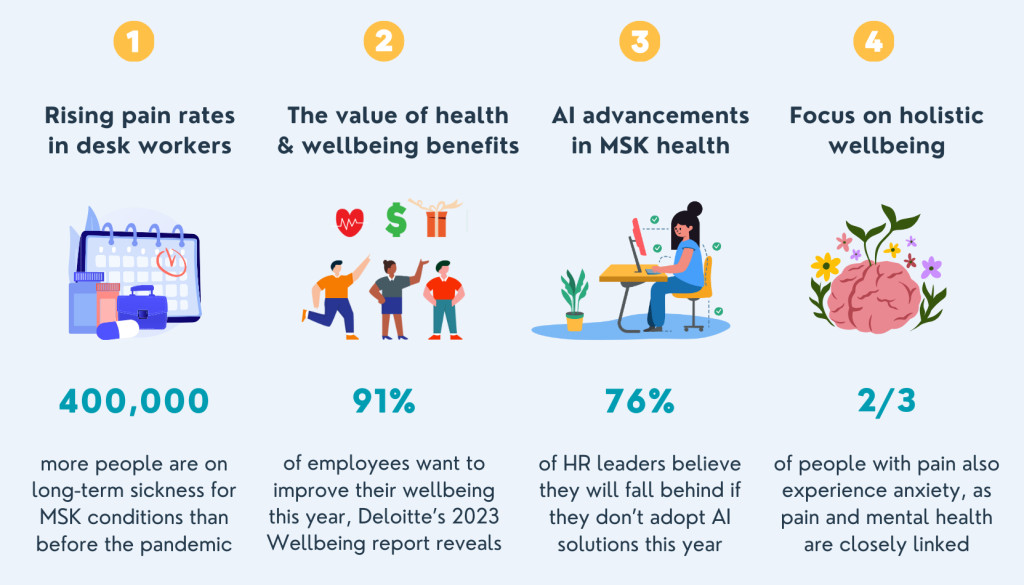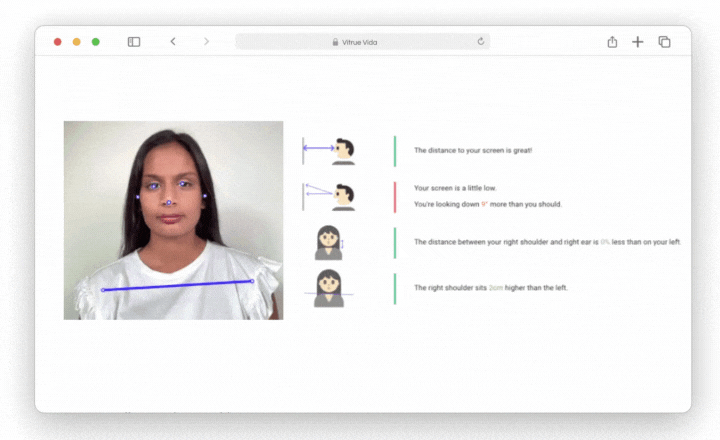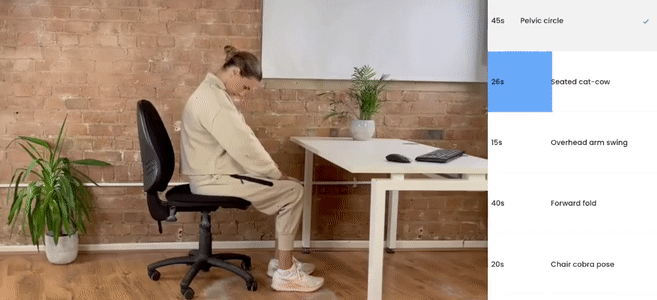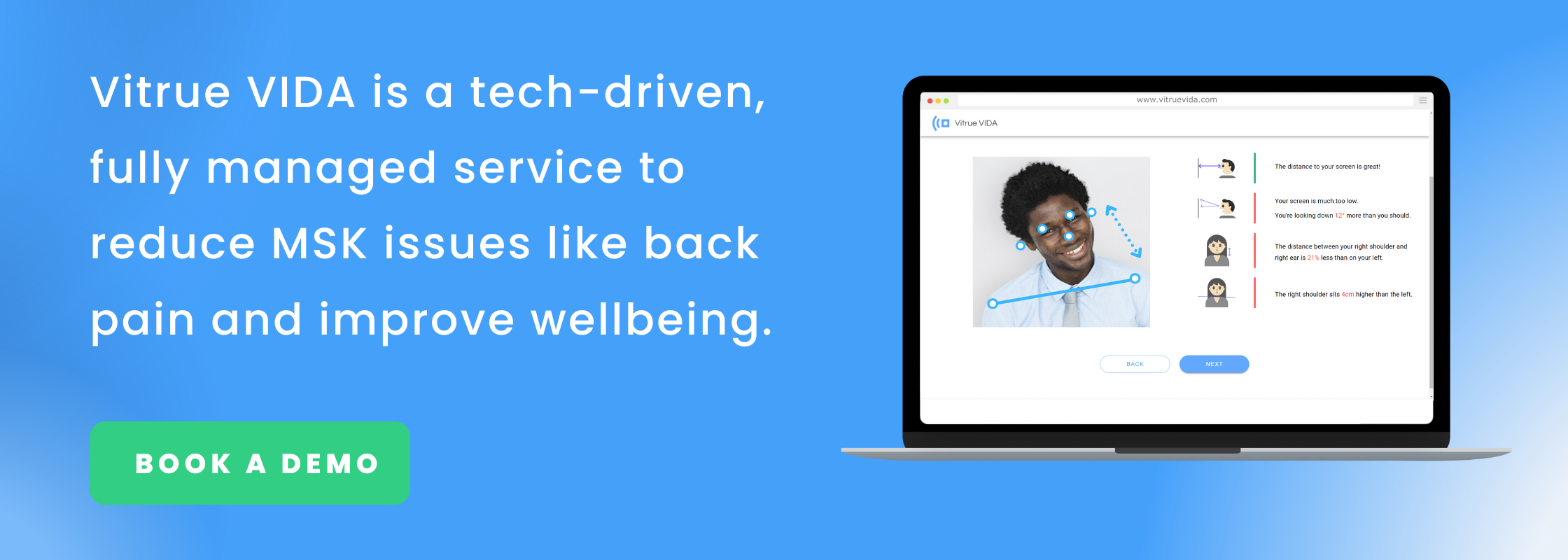Musculoskeletal (MSK) health in the workplace has been under the spotlight since rates of back, neck and shoulder pain skyrocketed during the pandemic. HSE’s latest statistics reveal the ongoing issue: 473,000 UK workers suffered from desk-related injuries last year alone, highlighting MSK health as a growing HR priority for 2024.
It’s not just a workplace concern – MSK health is having a profound impact on the wider economy. 23.3 million working days were lost to issues like back pain last year. And there’s currently one million people in the UK signed off for long-term sickness due to back or neck pain. In the 2023 Spring Budget, the UK government pledged £400 million investment to support people who are forced to leave work due to long-term pain, recognising the gravity of the situation.
Did you know? 65% of desk workers suffer from MSK issues like back pain, most commonly caused by poor posture and incorrect screen positioning in their workplace.

Why is MSK health a HR priority for 2024?
2024 presents a multitude of priorities and trends for HR teams to navigate. Alongside challenges such as advancements in AI technology and increasing pressure around benefits spend, MSK health remains a critical concern for businesses and staff.
Here are four compelling reasons why you need to address MSK health in 2024, and how it fits into the wider landscape of HR priorities:

1. The rising tide of MSK issues in desk workers
The shift to hybrid working during the pandemic led to a surge in MSK issues amongst desk workers. Today, over two thirds of all desk workers have pain which affects their productivity and overall workplace wellbeing.
Employees with pain have lower energy levels, higher rates of workplace absence and decreased productivity throughout the working day. In fact, 60% of all productivity losses in the workplace stem from MSK issues like back pain, costing the global economy a staggering $1.69 trillion each year!
Statistics show that 400,000 more people are now out of work due to long-term sickness compared to before the pandemic. And the numbers are growing every year. It’s about time for businesses to see MSK health in desk workers as a true priority for 2024.
Did you know? Over 70% of people out of work due to chronic pain reported they had more than one type of MSK issue.
2. The growing importance of health and wellbeing benefits
In today’s job market, health and wellbeing benefits are more important than ever for attracting and retaining talent. The Mercer People Risk Report 2023 identified employee health and wellbeing as a significant risk to culture and therefore a major HR priority for the year ahead.
83% of employees consider workplace benefits an important factor when looking for a new job, and two thirds of employees are concerned about at least one aspect of their wellbeing. However, 55% of HR leaders report pressure to reduce their total employee benefit spend, particularly when it comes to health and wellbeing benefits which are usually considered discretionary.
Investing in wellbeing tools with a dual purpose can help you prioritise MSK health when budgets are tight. Vitrue VIDA is an MSK pain management, DSE compliance and wellbeing tool wrapped into one, enabling you to pay for an employee benefit out of your mandatory compliance budget!
3. Leveraging AI technology in MSK health
Artificial intelligence (AI) is one of the hottest trends in the HR space right now, following the widespread adoption of tools such as ChatGPT. A recent Gartner survey found that 76% of HR leaders believe their organisation will fall behind if they don’t adopt AI solutions in the next 12 to 24 months.
Advancements in AI technology offer a huge opportunity for HR teams to prioritise MSK health in 2024. Leading digital tools like VIDA use innovative AI technology to reduce the risk of MSK pain in your team. VIDA’s computer-vision AI webcam assessment detects the position of your head, shoulders and the distance from your screen, providing instant AI generated suggestions to improve your posture and wellbeing.
As the digital transformation trend continues to ripple through the HR world, tools like VIDA can help you stay ahead of the game and prioritise MSK health at your company.

4. Embracing holistic wellbeing solutions
In the past, most wellbeing tools and solutions addressed only one aspect of health and wellbeing. Fitness apps for physical health, meditation apps for mental health, and so on. Now in 2024, there’s a growing understanding that our wellbeing is in fact multidimensional, with a trend towards more holistic and all-encompassing wellbeing solutions.
Your mental and physical health is closely intertwined. 54% of people with chronic pain experience anxiety. Even short term pain as a result of injury can have a big impact on your mental health, so it’s clear that MSK plays a huge part in your overall wellbeing.
Holistic wellbeing solutions like VIDA address a wide range of factors such as pain, ergonomics and workplace setup. VIDA offers personalised exercises and education to help your team reduce MSK pain and look after all other aspects of their wellbeing.

For more information on how VIDA can help you prioritise MSK health at your company in 2024, get in touch with us at sales@vitruehealth.com or book a demo today.





